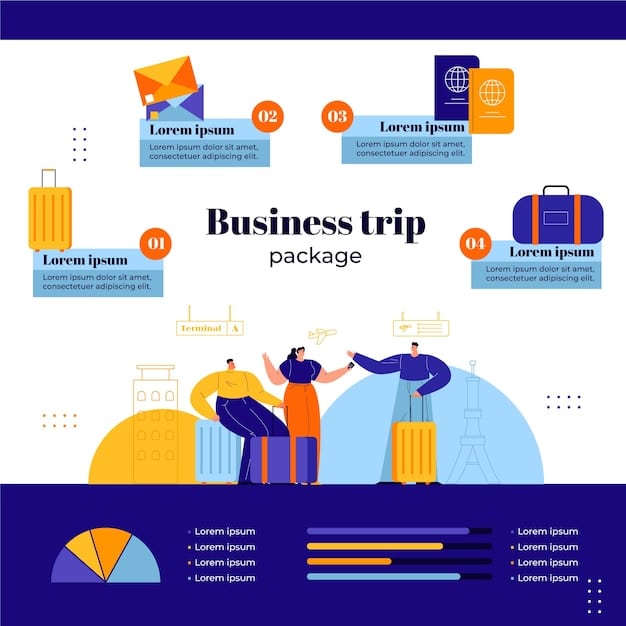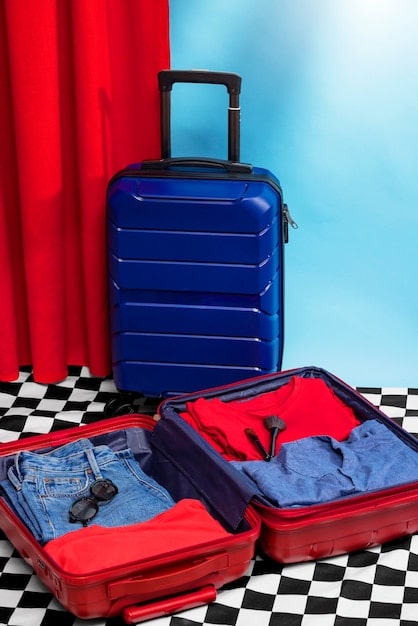Budget Airlines in the US: Navigating Baggage Fee Policies

Anúncios
Budget airlines in the US attract travelers with low fares, but understanding their baggage fee policies is crucial to avoid unexpected costs and ensure a budget-friendly trip.
Budget airlines in the US offer enticingly low base fares, but travelers often find themselves facing a maze of additional fees, especially when it comes to baggage. Understanding these baggage fee policies is crucial for truly enjoying the benefits of budget travel and avoiding unpleasant surprises at the airport.
Anúncios
Understanding the Landscape of Budget Airlines in the US
Budget airlines have revolutionized air travel in the United States, offering significantly lower fares compared to traditional airlines. However, this affordability comes with a trade-off: a la carte pricing, where services like baggage, seat selection, and even snacks are charged separately.
To make informed decisions and optimize travel budgets, passengers need to understand how these airlines operate, particularly concerning baggage fees.
Anúncios
The Rise of Budget Airlines
Budget airlines, also known as low-cost carriers (LCCs), have gained immense popularity in the US by unbundling services. This approach allows passengers to pay only for what they need, leading to lower base fares that attract price-sensitive travelers.
- Unbundling Services: Core strategy is to offer low base fares and charge separately for baggage, seat selection, and other amenities.
- Focus on Secondary Airports: Often operate from smaller, less congested airports to reduce costs.
- Dense Seating Configuration: Maximize passenger capacity by using a denser seating arrangement.
Knowing the origins and operating principles of these airlines is crucial to understanding why baggage fees are a significant part of their revenue model.

Key Players in the US Budget Airline Market
Several major players dominate the budget airline sector in the US, each with its unique approach to pricing and baggage fees. Familiarizing yourself with these airlines is the first step to making informed choices.
- Spirit Airlines: Known for its ultra-low fares and extensive fee structure.
- Frontier Airlines: Offers a similar model to Spirit, with various add-on charges.
- Allegiant Air: Focuses on leisure destinations and smaller markets.
Understanding each airline’s specific routes, service offerings, and baggage policies is essential for planning a cost-effective trip.
In summary, budget airlines in the US provide affordable travel options by unbundling services and charging separately for extras like baggage. Knowing the key players and their distinct approaches is critical for passengers aiming to minimize costs and avoid surprises.
Decoding the New Baggage Fee Policies
Baggage fees have become a significant revenue stream for budget airlines in the US. Understanding the nuances of these policies, including size and weight restrictions, is essential for avoiding unexpected costs.
By carefully reviewing the specific baggage policies of each airline, travelers can make informed choices and potentially save a considerable amount of money.
Carry-On vs. Checked Baggage Fees
Budget airlines often charge fees for both carry-on and checked baggage, but the costs and restrictions vary significantly. Understanding these differences is critical for planning what to bring and how to pack.
- Carry-On Size and Weight Limits: Airlines have strict limits; exceeding them can result in gate fees.
- Checked Baggage Weight Limits: Typically 50 pounds; overweight bags can incur hefty surcharges.
- Seasonal/Route Variations: Baggage fees may vary based on the time of year or the specific route.
Careful planning and adherence to these rules can help passengers avoid unexpected fees at the airport.
Hidden Costs and Fine Print
The devil is often in the details when it comes to baggage fees. Budget airlines may have various hidden charges or fine print that can catch travelers off guard.
- Online vs. Airport Fees: Paying for baggage online is typically cheaper than at the airport.
- Connecting Flights: Fees may apply separately for each leg of a journey.
- Sports Equipment and Oversized Items: Often subject to special handling fees.
Carefully reviewing the terms and conditions can help passengers avoid these hidden costs and surprises.
Decoding baggage fee policies involves understanding the differences between carry-on and checked baggage fees, being aware of hidden costs, and carefully reviewing the fine print. By doing so, travelers can avoid unexpected expenses and better manage their budget.
Strategies to Avoid Baggage Fees
While baggage fees are a reality with budget airlines, there are several strategies travelers can employ to minimize or avoid these costs altogether. Smart packing and strategic planning can make a significant difference.
By implementing these techniques, passengers can maintain the affordability of budget travel without sacrificing essential items.
Packing Light and Efficiently
The most straightforward way to avoid baggage fees is to pack light and efficiently. This may involve rethinking your wardrobe and minimizing non-essential items.
- Use a Carry-On Only: Maximize your carry-on allowance and avoid checked baggage fees.
- Roll, Don’t Fold: Save space by rolling clothes tightly instead of folding them.
- Wear Bulky Items: Wear heavy shoes, jackets, and other bulky items to free up space in your luggage.
Mastering the art of packing light can significantly reduce baggage fees and make travel more convenient.

Leveraging Airline Credit Cards and Loyalty Programs
Some budget airlines offer credit cards or loyalty programs that provide benefits such as free checked baggage or priority boarding. These can be valuable tools for frequent travelers.
- Free Checked Baggage: Some airline credit cards offer a free checked bag for the cardholder and travel companions.
- Priority Boarding: Allows you to board early and secure space for your carry-on.
- Points and Rewards: Can be redeemed for free flights or other travel-related expenses.
By strategically using these programs, frequent travelers can offset baggage fees and enjoy additional benefits.
Avoiding baggage fees involves packing light and efficiently, leveraging airline credit cards and loyalty programs, and considering shipping items ahead of time. These strategies can help travelers maintain the affordability of budget air travel while still meeting their needs.
The Impact of Baggage Fees on Travel Behavior
Baggage fees have had a profound impact on how people travel, influencing decisions about what to pack, how to travel, and even which airline to choose. Understanding these effects is crucial for both travelers and airlines.
These fees have forced travelers to rethink their packing habits and consider alternative approaches to travel.
Shifting Consumer Preferences
Baggage fees have led to a shift in consumer preferences, with more travelers opting for carry-on only or seeking alternative transportation methods. Airlines need to adapt to these changing behaviors.
- Carry-On Only Trend: More travelers are prioritizing carry-on luggage to avoid fees.
- Alternative Transportation: Some passengers may choose to drive or take a train instead of flying to avoid fees.
- Airline Selection: Baggage fees can influence airline choice, especially for price-sensitive travelers.
Airlines must understand these shifts and adjust their strategies to meet evolving consumer demands.
Alternative Transportation Methods
Shipping luggage ahead is another strategy worth considering.
Shipping luggage ahead allows travelers to send their belongings to their destination, bypassing airline baggage fees altogether. This can be particularly useful for longer trips or when traveling with bulky items.
- Cost Comparison: Evaluate the cost of shipping against airline baggage fees to determine the most economical option.
- Convenience: Avoid the hassle of lugging heavy bags through airports.
- Specialized Services: Some companies specialize in shipping sports equipment or other oversized items.
Shipping luggage ahead of time can be a convenient and cost-effective way to avoid baggage fees and streamline the travel experience.
Baggage fees have significantly impacted travel behavior, leading to shifts in consumer preferences, alternative transportation considerations, and driving innovation in luggage and packing solutions. These changes require both travelers and airlines to adapt and innovate.
The Future of Baggage Fees
The future of baggage fees in the US remains uncertain, but several trends and innovations are likely to shape the landscape in the coming years. Technology, changing consumer expectations, and airline revenue strategies will play a significant role.
Keeping abreast of these developments will enable travelers to prepare for future changes and continue to optimize their travel budgets.
Technological Innovations
Technological innovations are likely to play a key role in the future of baggage handling and fees. Smart luggage, tracking systems, and automated check-in processes could all impact the passenger experience.
- Smart Luggage: Features built-in scales, GPS tracking, and digital locks.
- Tracking Systems: Real-time tracking to monitor the location of luggage.
- Automated Check-In: Streamlined check-in processes using mobile apps and kiosks.
These technologies can improve efficiency and transparency in baggage handling, potentially leading to changes in fee structures.
New Airline Revenue Strategies
As competition intensifies, airlines are continuously exploring new revenue strategies beyond baggage fees. Bundled fares, subscription models, and targeted advertising could all become more prevalent.
- Bundled Fares: Packages that include baggage, seat selection, and other amenities at a discounted price.
- Subscription Models: Monthly or annual fees for unlimited baggage or other benefits.
- Targeted Advertising: Revenue from onboard advertising and partnerships.
These new strategies could offer travelers more flexibility and value while providing airlines with alternative revenue streams.
The future of baggage fees is likely to be shaped by technological innovations, new airline revenue strategies, and evolving consumer demands. Staying informed about these trends and developments will empower travelers to navigate the changing landscape effectively.
Conclusion: Navigating Baggage Fees with Confidence
Understanding the baggage fee policies of budget airlines in the US is essential for cost-effective travel. By knowing the rules, employing smart packing strategies, leveraging loyalty programs, and staying informed about industry trends, travelers can navigate the landscape with confidence.
Taking control of travel costs enables passengers to enjoy the benefits of budget airlines without the stress of unexpected fees.
| Key Point | Brief Description |
|---|---|
| 💰 Baggage Fees | Budget airlines charge separately for carry-on and checked bags. |
| 🧳 Packing Light | Efficient packing helps avoid baggage fees and saves space. |
| 💳 Airline Programs | Credit cards and loyalty programs can offer free baggage. |
| 📦 Shipping Luggage | Shipping items ahead can be cost-effective for longer trips. |
FAQ
▼
No, baggage fees vary significantly between different budget airlines. Each airline has its own pricing structure, size and weight restrictions, and policies for carry-on and checked baggage, so it’s important to check directly with the carrier.
▼
Paying for baggage online is typically cheaper than paying at the airport. Airlines often charge higher fees at the airport to incentivize passengers to purchase services in advance, helping them plan for logistical needs.
▼
If your carry-on bag exceeds the airline’s size or weight limits, you will likely be required to check it at the gate, and you will have to pay the applicable checked baggage fee, which is usually higher than paying for it online.
▼
Yes, shipping your luggage can be a good way to avoid airline baggage fees. Compare the shipping costs with the airline’s baggage fees to determine the most cost-effective option. Companies like UPS and FedEx offer these services.
▼
Yes, some airline-branded credit cards offer free checked baggage as a perk. These cards typically have an annual fee, so evaluate whether the benefits outweigh the costs based on how often you travel with that airline.
Conclusion
By understanding the nuances of baggage fee policies, travelers can make informed decisions, employ strategic packing techniques, and explore alternative solutions to minimize costs and enjoy a stress-free travel experience with budget airlines in the US.




